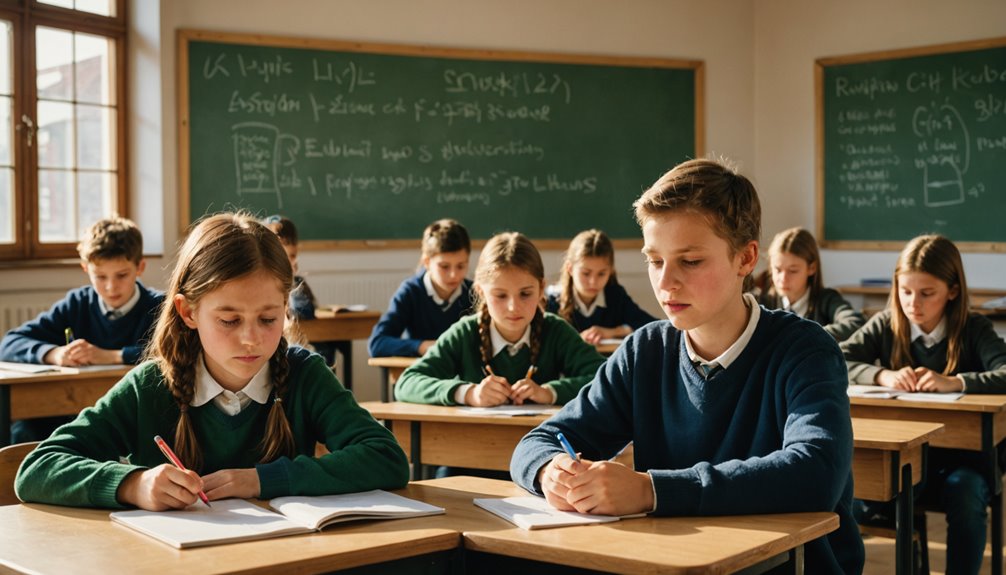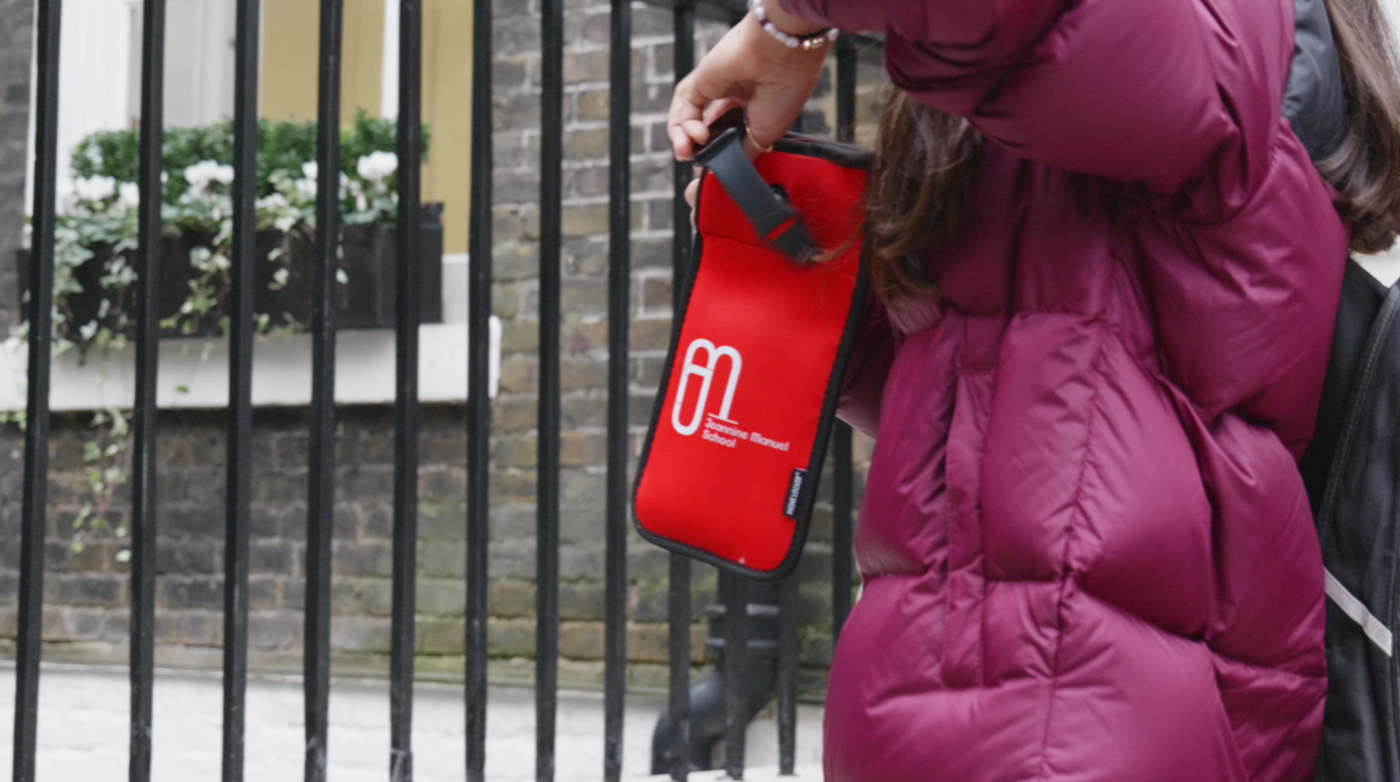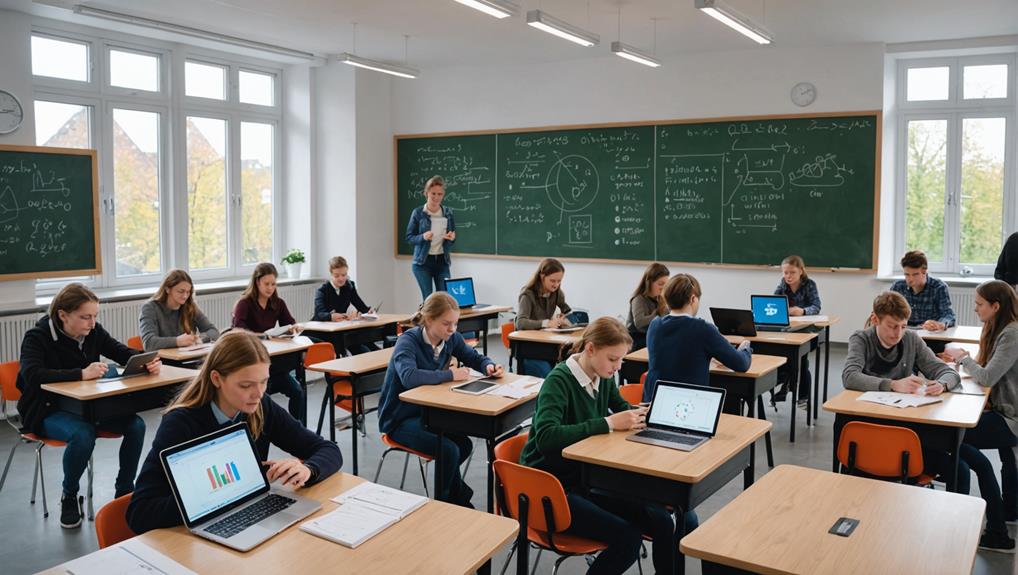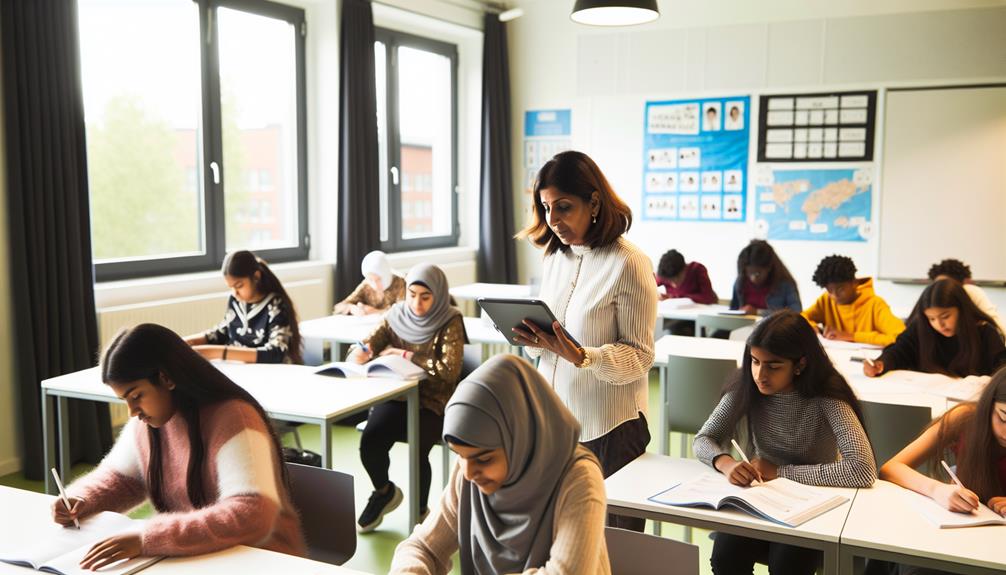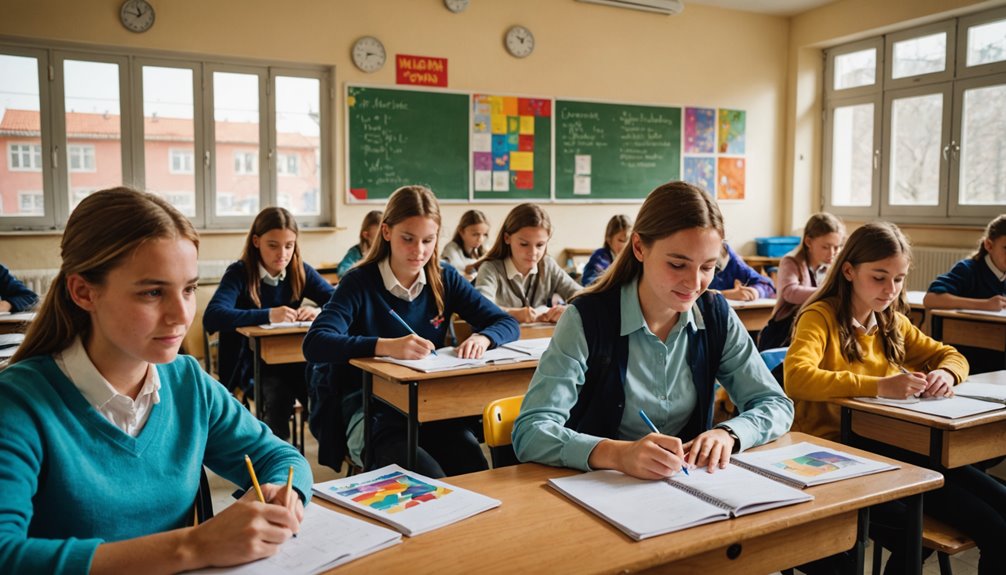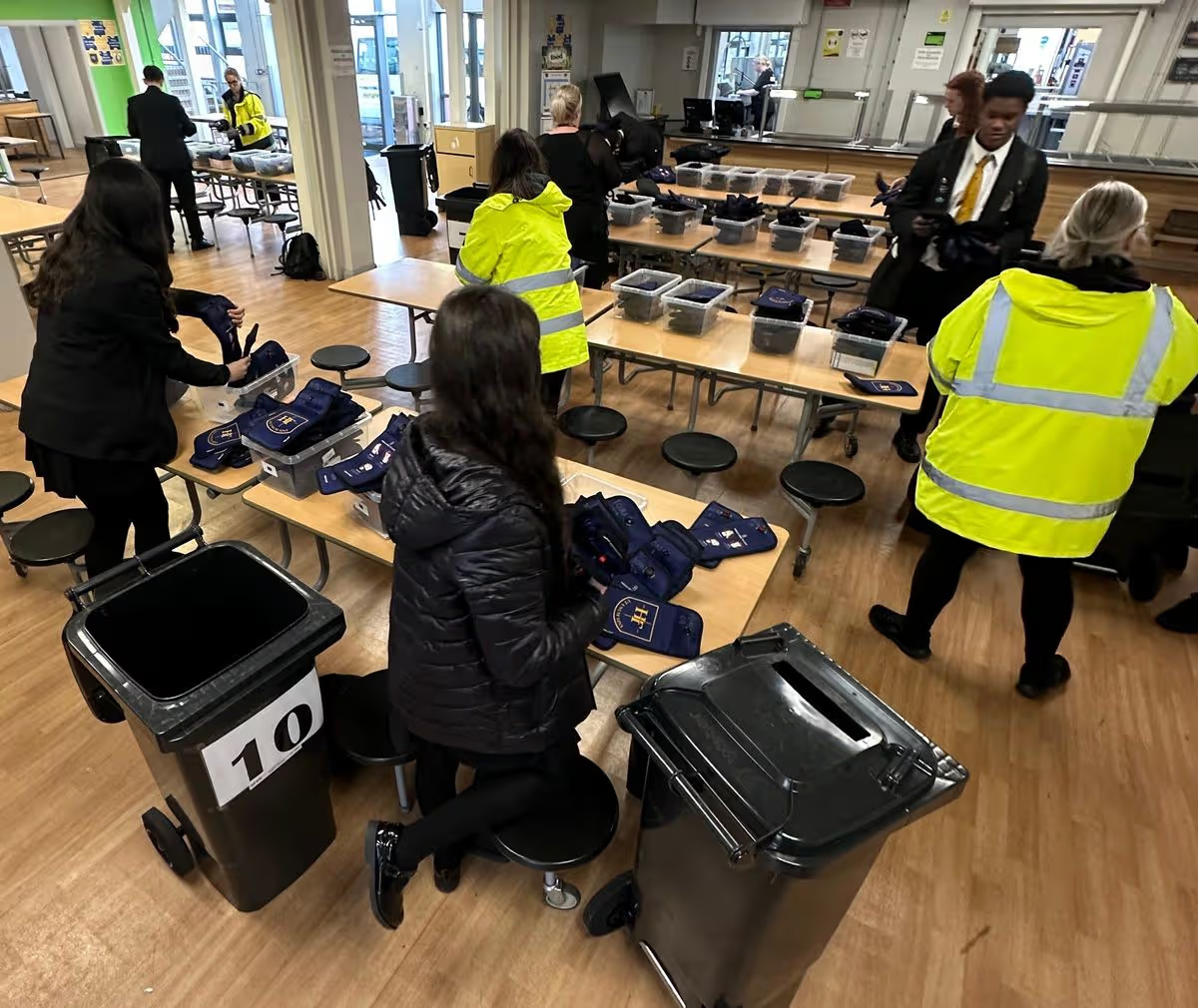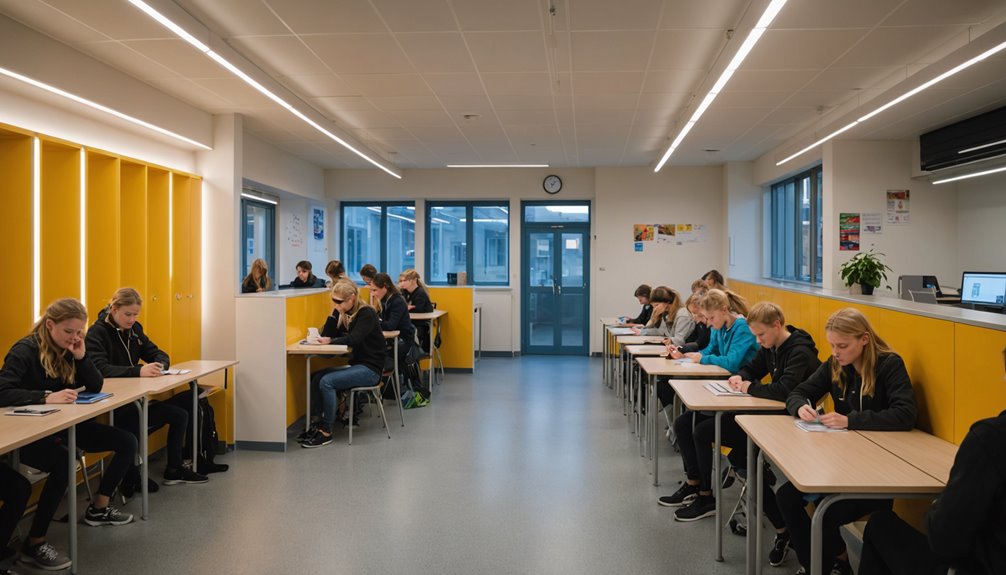Uso del teléfono en las escuelas checas: ¿prohibición o equilibrio?
Las escuelas checas tienen la autonomía establecer sus propias políticas sobre el uso del teléfono móvil, lo que genera una variabilidad significativa. Algunas escuelas, como las de Vsetín, han implementado Prohibiciones de teléfonos para mejorar el enfoque académico y abordar adicción a la tecnología, lo que refleja una tendencia mundial en materia de política educativa. Sin embargo, estas prohibiciones enfrentan desafíos, entre ellos: Resistencia de los estudiantes y las preocupaciones de los padres sobre la comunicación y los derechos personales. La eficacia de estas políticas se ve a menudo socavada por una aplicación inconsistente y dificultades logísticas. A medida que las escuelas checas equilibran alfabetización digital Al minimizar las distracciones, comprender estas dinámicas revela las complejidades involucradas en el establecimiento de políticas efectivas de uso del teléfono.
Conclusiones clave
- Las escuelas en la República Checa tienen autonomía para establecer sus propias políticas de uso de teléfonos móviles, que van desde prohibiciones totales hasta un uso sin restricciones.
- La prohibición de teléfonos móviles en algunas escuelas checas tiene como objetivo mejorar la concentración académica y frenar la adicción a la tecnología entre los estudiantes.
- La participación y el apoyo de los padres son cruciales para la implementación efectiva de políticas sobre el uso del teléfono en las escuelas checas.
- Los desafíos para hacer cumplir las prohibiciones de los teléfonos incluyen la resistencia de los estudiantes, el cumplimiento inconsistente de los docentes y cuestiones logísticas.
- Las políticas se adaptan en función de los comentarios y enfatizan el uso responsable de la tecnología y la educación sobre seguridad en línea.
Las escuelas checas establecen sus propias normas sobre el uso de teléfonos móviles
En la República Checa, la Autonomía concedida a las escuelas Según la legislación nacional, les permite establecer sus propias políticas de uso de teléfonos móviles, lo que da como resultado una panorama diverso de regulacionesEsta flexibilidad conduce a una falta de coherencia en las políticas, y algunas escuelas adoptan prohibiciones totales y otros implementando restricciones parciales o permitir uso sin restriccionesEsta variabilidad refleja a menudo los diferentes niveles de participación de los padres, ya que las escuelas negocian con padres que pueden tener opiniones contrastantes sobre el uso de los teléfonos inteligentes.
El impacto educativo de los teléfonos móviles es un factor fundamental en estos debates. Las investigaciones indican que el uso sin restricciones puede provocar importantes distracciones en los estudiantes, lo que perjudica el rendimiento académico. En consecuencia, algunas escuelas optan por implementar medidas más estrictas para mitigar estas distracciones, promoviendo un entorno de aprendizaje más centrado.
Sin embargo, esto plantea interrogantes sobre cómo lograr un equilibrio tecnológico, ya que las escuelas deben encontrar formas de integrar herramientas tecnológicas beneficiosas sin comprometer los objetivos educativos.
El enfoque checo pone de relieve el desafío de alinear las diversas políticas con los objetivos educativos generales. Si bien la autonomía permite Soluciones a medida, también puede conducir a resultados desiguales. Explorando un enfoque más enfoque estandarizado Podría ayudar a armonizar los beneficios de la tecnología con la necesidad de mantener una marco educativo eficaz.
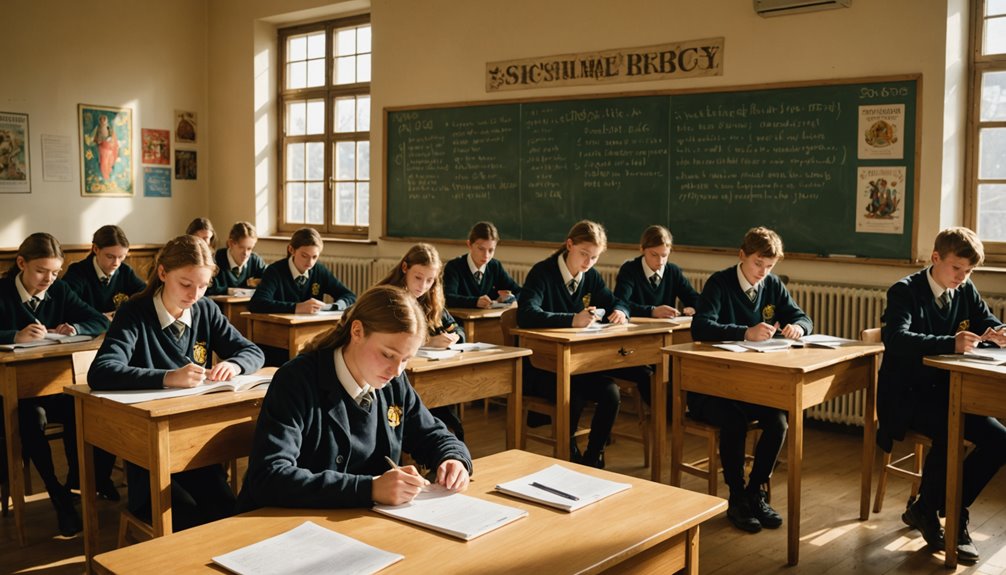
Vsetín implementa la prohibición del teléfono en las escuelas
En Septiembre de 2024, la ciudad de Vsetín En la República Checa Región de Zlín se convirtió en el primer municipio del país en implementar una Prohibición total de teléfonos móviles en todas sus escuelas primarias. Esta política innovadora se aplica a cinco escuelas primarias administradas por el ayuntamiento. Según las nuevas normas, Los estudiantes deben entregar sus teléfonos a los profesores al comienzo del día., y los dispositivos se almacenan de forma segura en Taquillas con cerradura, sólo se devuelve cuando termina la jornada escolar.
Para garantizar una aplicación uniforme, el consejo invirtió en cajas de almacenamiento seguras para todas las aulas. El incumplimiento se considera una violación de las reglas escolares, con consecuencias que van desde advertencias hasta reprimendas formales por parte de los directores de las escuelas. La iniciativa tiene como objetivo:
- Eliminar distracciones Durante las lecciones.
- Fomentar las interacciones interpersonales Durante los descansos.
- Reducir los riesgos del ciberacoso.
Mientras que muchos Los educadores y los padres apoyan la prohibición, citando su potencial para Mejorar la concentración académica y reducir dependencia digitalOtros la han criticado. Algunos consideran que la política es excesivamente autoritaria, que recuerda a las restricciones de la era socialista pasada, y sostienen que infringe derechos de los niños. A pesar de estas críticas, La política de Vsetín ha suscitado un debate nacional y podría servir como modelo para otras ciudades checas que consideren medidas similares.
Razones detrás de la prohibición
La decisión de Vsetín de imponer la prohibición de usar teléfonos en las escuelas se basa en una multitud de consideraciones educativas y de desarrollo. La razón principal se centra en la Impacto en el aprendizaje, ya que las investigaciones destacan constantemente cómo los teléfonos móviles distraen a los estudiantes y disminuyen la concentración, lo que perjudica la enseñanza eficaz. Esta decisión se alinea con un reconocimiento global más amplio de que reducir el tiempo frente a la pantalla puede mejorar participación de los estudiantes y contribuir positivamente a desempeño académico.
Varios factores clave subrayan la necesidad de esta prohibición:
- Interrupción académica:Los teléfonos móviles son distracciones importantes que reducen el rendimiento de los estudiantes. Enfoque y compromiso en las clases. Las notificaciones y las interrupciones de las redes sociales dificultan la concentración, mientras que la prohibición de los teléfonos crea un entorno más propicio para el aprendizaje.
- Riesgos para la salud mental:El uso excesivo del teléfono está relacionado con Ansiedad, depresión y falta de sueño Entre los niños. Los estudios revelan que 40% de estudiantes checos de noveno grado muestran signos de depresión moderada a severa, lo que enfatiza la necesidad de abordar uso excesivo de lo digital En las escuelas.
- Preocupaciones del desarrollo:Los teléfonos pueden acrobacias comunicación verbal, pensamiento crítico, y interacción socialLa dependencia excesiva de las pantallas disminuye la capacidad de los estudiantes para conectarse de manera significativa con sus compañeros, habilidades esenciales para su crecimiento personal y académico.
- Prevención del acoso cibernético:Al restringir el acceso a los teléfonos, las escuelas pretenden reducir el acoso cibernético Durante el horario escolar, fomentando una Más seguro y con mayor apoyo Ambiente para los estudiantes.
Aunque algunos padres se preocupan por la severidad de la prohibición, muchos apoyan su potencial para reducir dependencia digital y promover hábitos más saludablesEsta política representa un paso hacia el equilibrio del papel de la tecnología en la educación y al mismo tiempo prioriza bienestar estudiantil.
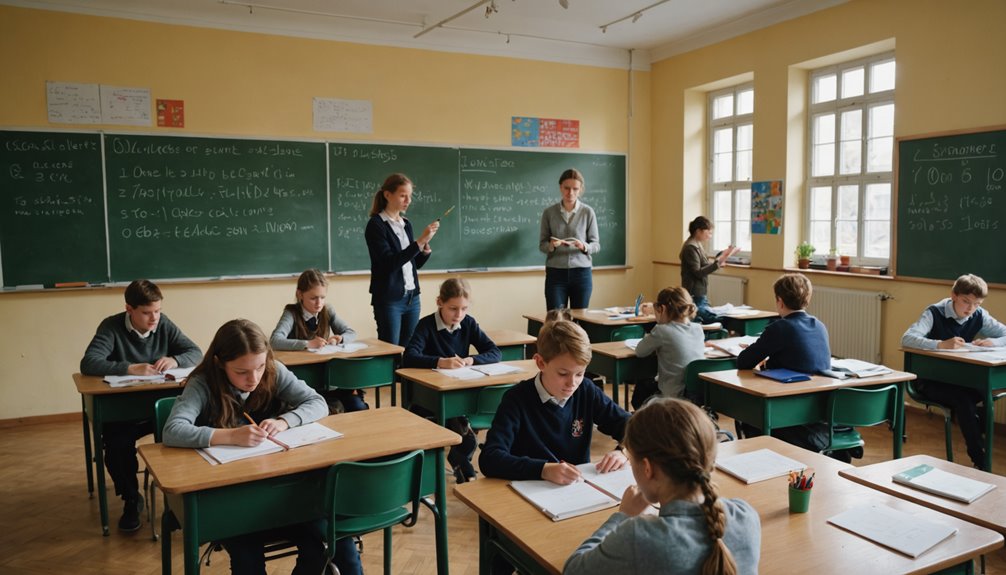
Desafíos y críticas a la aplicación de la prohibición de los teléfonos móviles
A pesar de los beneficios potenciales de la prohibición de los teléfonos móviles en las escuelas, varios desafíos y críticas surgen en su implementación. Preocupaciones de los padres son importantes y algunos padres perciben estas prohibiciones como violaciones de sus derechos y que recuerdan a medidas autoritarias. Argumentan que tales restricciones limitan su capacidad de mantenerse en contacto con sus hijos durante el horario escolar.
Además, Los estudiantes muestran resistencia, a menudo encontrando formas creativas de eludir las prohibiciones, como ocultar sus dispositivos o usarlos discretamente, lo que socava el enfoque previsto y las mejoras de comportamiento.
Cumplimiento docente Otro obstáculo es que no todos los educadores aplican las prohibiciones de manera sistemática. Garantizar el cumplimiento aumenta las responsabilidades de los docentes y el personal escolar, que pueden estar ya sobrecargados por sus obligaciones existentes. Esta incoherencia puede reducir la eficacia de la política y crear disparidades en su aplicación.
Los opositores argumentan que las prohibiciones totales ignoran el potencial beneficios educativos de dispositivos móviles, como el acceso a recursos de aprendizaje y herramientas de colaboración digital. El desafío radica en diferenciar entre Uso productivo y distractor.
Además, mandatos gubernamentales La imposición de tales prohibiciones genera críticas, ya que algunos las consideran excesivas y violan las libertades personales y la autonomía local.
Logística de almacenamiento Esto complica aún más la aplicación de la ley, ya que las escuelas deben garantizar la seguridad de los dispositivos confiscados. Gestionar la recogida y el almacenamiento de cientos de teléfonos a diario plantea un desafío práctico, que requiere recursos e infraestructura que pueden no estar fácilmente disponibles.
Fundas para teléfono con cierre de PhoneLocker ofrece una forma segura de guardar los teléfonos durante el horario escolar, lo que evita robos o manipulaciones. Cada dispositivo se coloca en una funda individual que solo el personal autorizado puede desbloquear, lo que garantiza que los teléfonos se guarden de forma segura y se minimicen las distracciones. Este sistema también brinda tranquilidad tanto a los estudiantes como a las escuelas, ya que permite controlar los dispositivos durante todo el día.
Enfoques globales para la prohibición de teléfonos en las escuelas
La cuestión del uso de teléfonos móviles en las escuelas es un tema de creciente preocupación en toda Europa. Varios países han implementado políticas diversas en respuesta al impacto negativo que tiene el exceso de tiempo frente a las pantallas en el aprendizaje y el bienestar de los estudiantes.
En Francia, a Prohibición nacional de teléfonos móviles en las escuelas En 2018 se introdujo una prohibición para los estudiantes menores de 15 años. El objetivo era reducir las distracciones y fomentar las interacciones sociales cara a cara. Los primeros comentarios sugieren que la prohibición ha tenido efectos positivos en la concentración en el aula, aunque algunos sostienen que limita el contacto de emergencia con los padres.
Alemania El modelo descentralizado de la educación adopta un enfoque más flexible, con políticas que difieren según el estado. Algunas regiones imponen prohibiciones estrictas de uso de teléfonos, mientras que otras permiten su uso con fines educativos o durante los recreos. Este modelo descentralizado refleja la creencia del país en la autonomía escolar, pero genera inconsistencias entre regiones.
En ItaliaLas diferencias regionales también dan lugar a políticas diversas sobre el uso del teléfono en las escuelas. Mientras que algunas zonas han impuesto prohibiciones totales, otras permiten el uso del teléfono en horarios específicos. Esta inconsistencia ha suscitado un debate sobre la necesidad de una política nacional más unificada.
Finalmente, Finlandia y Dinamarca Han incorporado el uso responsable de la tecnología en sus marcos educativos, promoviendo la alfabetización digital junto con las asignaturas tradicionales. Estos países equilibran la integración de la tecnología con el objetivo de fomentar hábitos saludables en el uso del teléfono.
Estos ejemplos europeos reflejan una variedad de estrategias, desde prohibiciones totales hasta usos regulados, y muestran el desafío de encontrar el equilibrio adecuado. El enfoque descentralizado de la República Checa refleja esta diversidad, como se vio recientemente en la medida de Vsetín de imponer la prohibición de los teléfonos móviles en sus escuelas.
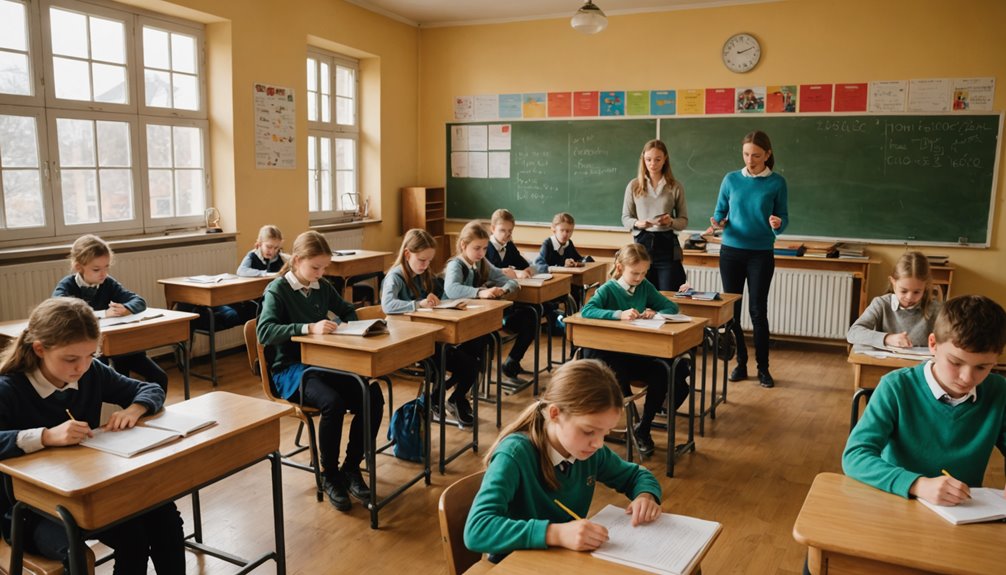
Prohibición total vs. moderación
Al considerar el debate entre implementar una prohibición total en los teléfonos móviles en las escuelas frente a la adopción de un enfoque más enfoque moderadoLa principal preocupación gira en torno a equilibrar los beneficios educativos con posibles inconvenientes.
Una prohibición total, como la de Vsetín, responde a las preocupaciones de los padres sobre las distracciones y la interacción social, garantizando así que los estudiantes se concentren en el aprendizaje. Este enfoque puede mitigar el acoso y mejorar el impacto educativo al crear un ambiente de aprendizaje positivo. ambiente propicio para desempeño académico. Sin embargo, plantea cuestiones sobre la vulneración de los derechos de los padres y la viabilidad de su aplicación.
Por el contrario, un enfoque moderado permite Integración de tecnología, abrazando la realidad de alfabetización digital en educación modernaTiene en cuenta las perspectivas de los estudiantes y reconoce que muchos consideran que los dispositivos digitales son herramientas esenciales para el aprendizaje. Esta estrategia puede preparar mejor a los estudiantes para un futuro dependiente de la tecnología. Sin embargo, exige políticas sólidas para garantizar uso responsable, lo cual puede resultar difícil de implementar de manera consistente.
En definitiva, ambos enfoques presentan argumentos válidos. Mientras que una prohibición total prioriza las mejoras inmediatas en la interacción social y la concentración, la moderación fomenta la comprensión del uso responsable de la tecnología. Las escuelas deben sopesar estas opciones, teniendo en cuenta sus contextos únicos y las diversas necesidades de sus estudiantes y comunidades.
Uso de fundas para teléfonos con candado para hacer cumplir la prohibición de usar teléfonos en las escuelas
A medida que las escuelas de la República Checa, incluidas las de Vsetín, comienzan a aplicar políticas telefónicas más estrictas, la gestión eficiente del almacenamiento de los teléfonos se ha convertido en un desafío cada vez mayor. Una prohibición de teléfonos bien implementada requiere más que solo reglas: necesita una solución segura y práctica para mantener los dispositivos de los estudiantes fuera del alcance y evitar distracciones. Aquí es donde Bloqueo de teléfono's bolsas de teléfono con cierre Ofrecer una herramienta valiosa para las escuelas.
Bloqueo de teléfono proporciona un método seguro y fácil de usar para que las escuelas recopilen, almacenen y administren los teléfonos de los estudiantes durante el horario escolar. A diferencia de otros sistemas, como Yondr, que normalmente están diseñados para eventos de corta duración como conciertos, Bloqueo de teléfono Se centra en el uso cotidiano y a largo plazo dentro de las escuelas, ofreciendo una solución simple y eficiente para las prohibiciones de teléfonos que duran todo el día.
Principales ventajas de las fundas PhoneLocker para escuelas
Para entender por qué las fundas PhoneLocker se destacan como una solución práctica para las escuelas, analicemos en profundidad sus beneficios únicos. Estas fundas abordan los desafíos críticos de hacer cumplir las prohibiciones de teléfonos, combinando simplicidad, personalización y eficacia. A continuación, se muestran las ventajas clave que hacen de PhoneLocker una opción ideal para las escuelas que buscan reducir las distracciones y mejorar la participación de los estudiantes.
- Seguro y sencillo:Los teléfonos se guardan en fundas a prueba de manipulaciones, lo que reduce las distracciones sin necesidad de aplicar políticas complicadas. Los profesores pueden gestionar fácilmente la recogida de teléfonos, lo que garantiza que los estudiantes no puedan acceder a sus dispositivos durante el horario escolar.
- Personalizable:Las escuelas pueden personalizar las bolsas con diferentes colores o etiquetas, lo que permite una fácil identificación y al mismo tiempo mantiene la organización. Esta personalización ayuda a agilizar el proceso para los profesores y administradores.
- Mejora la concentración y la interacción social:Al limitar el uso del teléfono, se anima a los estudiantes a interactuar cara a cara, lo que fomenta mejores habilidades sociales y mejora la concentración en clase. La reducción del tiempo frente a la pantalla también favorece una mejor salud mental y bienestar.
- Asequible y fácil de implementar: Bloqueo de teléfono Es una solución asequible y fácil de adoptar para las escuelas sin necesidad de una gran capacitación o infraestructura, lo que la convierte en una opción ideal para instituciones de todos los tamaños.
Dado que las prohibiciones de teléfonos se están volviendo más comunes en las escuelas, PhoneLocker ofrece una solución fácil de usar y segura para administrar el uso del teléfono. Ya sea que una escuela aplique una prohibición total o restricciones parciales, Funda para teléfono PhoneLocker Se puede personalizar para adaptarse a sus necesidades específicas, garantizando una implementación fluida de las políticas de telefonía móvil.
Para obtener más detalles sobre cómo las fundas para teléfonos con cerradura de PhoneLocker pueden ayudar a hacer cumplir las políticas de telefonía móvil de su escuela, Contáctenos.
Preguntas frecuentes
Como dice el refrán, “el diablo está en los detalles”. Las reacciones de los padres son variadas y expresan preocupación por las consecuencias para los estudiantes y las excepciones de emergencia. La prohibición afecta las interacciones sociales, lo que motiva una evaluación de la eficacia para equilibrar la disciplina con la conectividad.
La violación de la prohibición de usar el teléfono puede dar lugar a medidas disciplinarias, con posibles repercusiones en el rendimiento académico, las relaciones con los compañeros y la salud mental. Abordar las distracciones en el aula es fundamental para fomentar un entorno propicio para el aprendizaje y el bienestar de los estudiantes.
Por lo general, se consideran excepciones de emergencia a las prohibiciones de uso de teléfonos en las escuelas, y las reacciones de los padres varían. La aplicación eficaz de las consecuencias es fundamental para mantener el orden. Es necesaria una evaluación de las interacciones sociales y la eficacia general para garantizar una aplicación equilibrada de las políticas.
A medida que las pantallas digitales pasan a un segundo plano, las interacciones cara a cara pueden convertirse en el lienzo para desarrollar habilidades sociales. Las relaciones entre pares, la dinámica a la hora del almuerzo y las habilidades de comunicación podrían florecer, fomentando la construcción de una comunidad, mejorando la salud mental y limitando el tiempo frente a la pantalla.
La evaluación de la eficacia de la prohibición de los teléfonos móviles incluirá la evaluación del rendimiento de los estudiantes, la participación académica y las distracciones en el aula. También se analizarán los comentarios de los profesores y la influencia de los compañeros para comprender los impactos más amplios en el entorno educativo.
Conclusión
La implementación de prohibiciones de teléfonos móviles En las escuelas, como se observa en Vsetín, se destaca una tendencia mundial que prioriza el enfoque educativo y la gestión del comportamiento. ¿Cuáles son las implicaciones más amplias de tales políticas en el desarrollo de los estudiantes y la dinámica de la comunicación? Si bien la evidencia respalda la reducción de las distracciones y entornos de aprendizaje mejorados, persisten los desafíos para equilibrar estos beneficios con las preocupaciones sobre derechos de los padresA medida que varios países adoptan medidas similares, examen en curso Tanto el análisis de los resultados como las críticas serán esenciales para dar forma a las futuras estrategias educativas.


